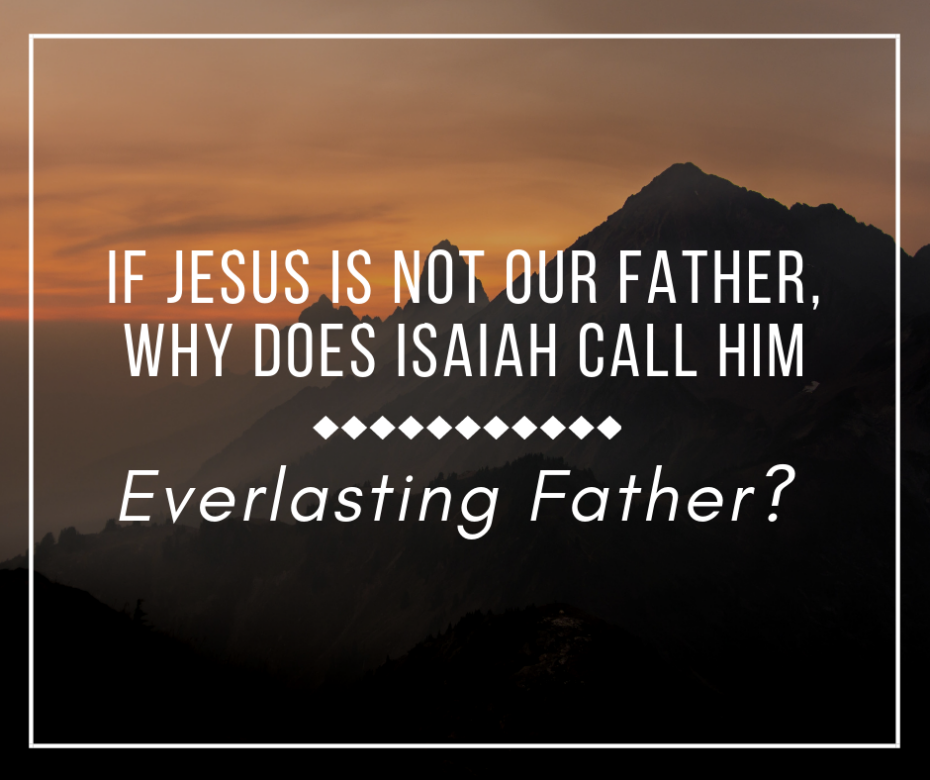“For unto us a Child is born, unto us a Son is given;
And the government will be upon His shoulder.
And His name will be called Wonderful, Counselor, Mighty God,
Everlasting Father, Prince of Peace” (Isaiah 9:6).
My sister asked me whether I thought songs which call Jesus our Father are incorrect. If God the Father is our Father—and He is, then it seems odd to say that Jesus is our Father too. I think she has a good point.
The only verse I can think of which identifies Jesus as Father is Isaiah 9:6, quoted above. But while Isaiah 9:6 does identify the Messiah, that is, Jesus, as “Everlasting Father,”, that does not mean that He is our Father.
Remember that Jesus taught us to pray, “Our Father, who are in heaven…” We pray to God the Father, a Person distinct from God the Son. Though both are one Being, they are separate Persons, as is the Holy Spirit.
Jesus repeatedly spoke to His Father and said that God is His Father. See, for example, Matt 7:21; 10:32-33; 11:25, 26, 27; 12:50; 15:13; 16:17, 27; 18:10, 19, 35; 20:23; 25:34; 26:29, 39, 42, 53; Mark 8:38; 13:32; 14:36; Luke 2:49; 9:26; 10:21, 22; 22:29, 42; 23:34, 46; 24:49; John 2:16; 5:17, 19, 20, 21, 22, 23, 26, 30, 36, 37, 43, 45; 6:27, 32, 37, 39, 44, 45, 46, 57, 65; 8:16, 18, 19, 28, 29, 38, 49, 54; 10:15, 17, 18, 25, 29, 30, 32, 36, 37, 38; 11:41; 12:26, 27, 28, 49, 50; 13:1, 3; 14:2, 6, 7, 9, 10, 11, 12, 13, 16, 20, 21, 23, 24, 26, 28, 31; 15:1, 8, 9, 10, 15, 16, 23, 24, 26; 16: 3, 10, 15, 16, 17, 23, 25, 26, 27, 28, 32; 17:1, 5, 11,21, 24, 25; 18:11; 20:17, 21; Rev 2:27; 3:5, 21.
He also often said that God is the Father of believers: Matt 5:16, 45, 48; 6:1, 4, 6, 8, 9, 14, 15, 18, 26, 32; 7:11; 10:20, 29; 13:43; 18:14; 23:9; 28:19; Mark 11:25, 26; Luke 6:36; 11:2, 13; 12:30, 32; John 4:21, 23.
To the eleven disciples He said, “He who has seen Me has seen the Father” (John 14:9). That is, Jesus is the manifestation of God the Father. Compare John 1:18. No one has seen God the Father at any time. “The only begotten Son, who is in the bosom of the Father, He has declared Him.”
The Apostles often refer to God the Father and Jesus as two separate Persons. See Rom 1:7; 6:4; 15:6; 1 Cor 1:3; 8:6; 15:24; 2 Cor 1:2, 3; 11:31; Gal 1:1, 3, 4; 4:6; Eph 1:2, 3, 17; 2:18; 3:14; 5:20; 6:23; Phil 1:2; 2:11; Col 1:2, 3, 19; 2:2; 3:17; 1 Thess 1:1, 3; 3:11, 13; 2 Thess 1:1, 2; 2:16; 1 Tim 1:2; 2 Tim 1:2; Titus 1:4; Heb 1:5; 1 Pet 1:2, 3; 2 Pet 1:17; 1 John 1:2, 3; 2:1, 22, 23, 24; 4:14; 2 John 3, 9; Jude 1; Rev 14:1.
And, of course, God the Father called Jesus His Son at both Jesus’ baptism (Matt 3:17; Mark 1:11; Luke 3:22) and His transfiguration (Matt 17:5; 2 Pet 1:17).
The gospel coalition website says (see here), “It’s unlikely Isaiah has the Trinity in mind at all when he says the Messiah will be called Everlasting Father. It’s not the Messiah’s role within the Godhead, but the Messiah’s character toward us that Isaiah has in mind. Concerning the language of ‘Everlasting Father,’ Sam Storms calls it ‘a descriptive analogy pointing to Christ’s character . . . he is fatherly, father-like, in his treatment of us.’”
In his commentary on Isaiah, J. Alec Motyer says that Everlasting Father refers to “his relationship to his subjects” (p. 89) and to “his concern, care, and discipline” (p. 90). Similarly, John Martin in The Bible Knowledge Commentary says that the point is that “The Messiah will be a ‘fatherly’ Ruler” (p. 1053).
We should love and worship all members of the Trinity. But each is a separate Person. We do well not to confuse the three members of the Trinity.


